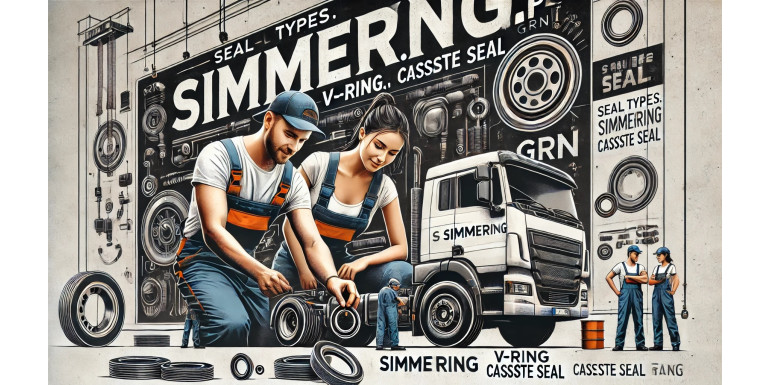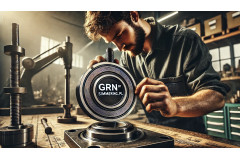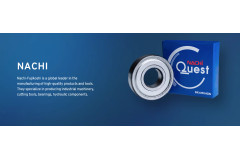
The Role of Technical and Mechanical Seals in Industry and Automotive – Types, Applications, and Products on simmering.pl
Introduction
Seals play a crucial role across various industries, including heavy industry, automotive, and machinery manufacturing. They extend the lifespan of equipment by minimizing leaks and protecting sensitive mechanical components from contamination. For professionals, selecting the right seal is not only a technical decision but also one that impacts process efficiency and maintenance costs. At simmering.pl, we offer a broad range of technical and mechanical seals tailored for demanding industrial and automotive applications.
What Are Technical and Mechanical Seals?
Technical seals encompass a wide array of products designed to seal connections, openings, or spaces that may be exposed to leaks or the infiltration of foreign substances. These seals are typically used where resistance to high temperatures, pressures, and aggressive media like acids or oils is required. Common applications include the petrochemical, food processing, pharmaceutical, and energy sectors.
Mechanical seals, on the other hand, are particularly vital in rotary systems such as drive shafts, pumps, and gearboxes. These seals are designed to withstand dynamic loads, high rotational speeds, and significant pressure differentials. Examples of their applications include internal combustion engines, transmissions, and various drive mechanisms.
Types of Seals Available on simmering.pl
1. Simmerrings (Radial Shaft Seals)
Simmerrings, also known as Radial Shaft Seals (RWDR), are among the most commonly used types of seals in the automotive and industrial sectors. They seal moving shafts, preventing oil leaks and protecting against the ingress of dirt and dust. Key parameters to consider when choosing Simmerrings include the material (e.g., NBR, FPM), rotational speed, operating temperature, and pressure. At simmering.pl, we offer Simmerrings from renowned brands such as GRN®, Simrit, and ASL, ensuring top quality and durability.
-
GRN® is our in-house brand, recognized since 2007 for its highly durable seals resistant to temperatures and abrasion. These seals undergo rigorous quality tests and are chosen for applications in both the automotive and heavy industrial sectors. The range includes seals in TC, SC, Cassette, and Combi versions, available in NBR and MVQ materials.
-
Simrit, a part of the Freudenberg Group, is synonymous with high precision and advanced sealing technology. Simrit offers seals with excellent resistance to extreme conditions, including high pressures and aggressive media. They are often used in industrial applications where reliability and durability are critical.
-
ASL specializes in manufacturing Simmerrings with various profiles and sizes, ideally suited to industrial requirements. ASL products are known for their high resistance to friction and low oil absorption, making them an excellent choice for agricultural machinery, commercial vehicles, and industrial equipment.
An example of a seal available on simmering.pl is the CORTECO 12011307 FPM B1RD, known for its resistance to high temperatures and oils, making it ideal for applications where temperatures can exceed 150°C. We also offer GRN® products, which are perfect for dynamic rotary applications where durability and reliability are key.
2. V-Rings
V-Rings are axial seals made of elastomers such as NBR (nitrile rubber) or FPM (fluoroelastomer). Their unique design includes a "V"-shaped body that allows them to fit various shaft diameters. The sealing lip of the V-Ring contacts the counterface, while the ring's body tightly fits the shaft, providing a reliable seal and flexible adjustment. This design allows V-Rings to accommodate slight assembly misalignments and resist axial movements of the shaft.
One of the key advantages of V-Rings is that they function as protective seals without direct contact with the shaft's surface. This minimizes wear and extends their service life compared to other contact-based seals. This feature makes them especially effective in systems where low friction and minimal energy consumption are required.
Technical Specifications of V-Rings:
- Operating temperature range:
- NBR: -30°C to +100°C
- FPM: -25°C to +200°C
- Hardness: Typically 60-70 Shore A, allowing flexibility and adaptability to sealing surfaces.
- Rotational speed: V-Rings can operate at speeds of up to 10 m/s, making them suitable for rotary applications.
Applications of V-Rings: V-Rings are primarily used as additional protection in rotary shaft seals, guarding against contamination, dust, water, and even small amounts of oil. They are commonly applied in:
- Bearings: Providing protection against dirt and dust, extending the lifespan of bearings in industrial machinery.
- Electric motors: Shielding against dust and moisture, which is crucial in challenging working environments.
- Gearboxes: Preventing contamination and protecting external Simmerrings from mechanical damage.
- Water pumps: In pump systems, where they protect against moisture and dust in applications such as cooling pumps.
Their flexibility allows V-Rings to be easily installed without disassembling other components, which is particularly advantageous for maintenance and servicing. Compared to traditional lip seals, V-Rings are effective in dusty environments and in situations where other seals might wear out quickly. At simmering.pl, we offer a wide range of V-Rings in different sizes and materials, tailored to the specific needs of industrial and automotive applications.
3. Combi and Cassette Seals
Cassette seals and Combi seals are advanced solutions for challenging working conditions, where exposure to moisture, mud, and heavy contamination is common. Typical applications include wheel hubs in commercial vehicles and agricultural equipment. By combining multiple sealing elements within a single housing, cassette seals provide enhanced protection against leaks and the ingress of solid particles, improving system reliability and durability.
4. RWDR (Radial Shaft Seals)
Radial shaft seals are essential for securing rotating shafts against leaks and contamination ingress. Their design typically consists of an elastomer sealing lip and a metal casing, ensuring stability even at high rotational speeds. These seals must resist wear and high temperatures. At simmering.pl, we offer high-quality CORTECO RWDR-K7 seals, known for their durability and robustness.
5. O-Rings and Seal Rings
O-Rings are simple yet highly effective seals, used in both static and dynamic applications. They are made from various materials such as NBR, FPM (Viton), or EPDM, which allows them to be adapted to specific working conditions like contact with chemicals, high pressures, or extreme temperatures. At simmering.pl, we offer a wide range of O-Rings, such as the Oring 7x2 NBR 70Shore, ideal for hydraulic and pneumatic systems.
Differences Between Technical and Mechanical Seals
Technical seals cover a broader range of products used to isolate or limit the flow of liquids, gases, and solids. Examples include flange gaskets or sealing plates. These are mainly used in static applications, where there is no mechanical movement.
Mechanical seals have a more advanced design, allowing them to operate in dynamic conditions, such as rotary or reciprocating motion. Precision in manufacturing is crucial for their durability and ability to minimize friction. Examples include Simmerrings, V-Rings, and Combi seals.
Examples of Applications for Technical and Mechanical Seals in Different Industries
- Automotive: Sealing of crankshafts, wheel hubs, and gearboxes. High demands for temperature and wear resistance mean that Simmerrings and cassette seals are frequently used in this industry.
- Chemical Industry: Seals resistant to aggressive media such as acids or bases. Choosing the right elastomer material, such as FPM, is critical in these cases.
- Energy Sector: Seals in turbines, generators, and pumps, where long-term resistance to high pressure and temperatures is essential.
Conclusion
Selecting the right seal is a key aspect of designing and maintaining mechanical equipment. The variety of materials, designs, and technical specifications requires in-depth knowledge and experience to ensure optimal performance. At simmering.pl, you will find a comprehensive range of technical and mechanical seals that meet the demands of even the most challenging industrial and automotive applications. We invite you to explore our offer and contact our experts, who will help you choose the best solution for your needs.




Leave a Reply Cancel Reply